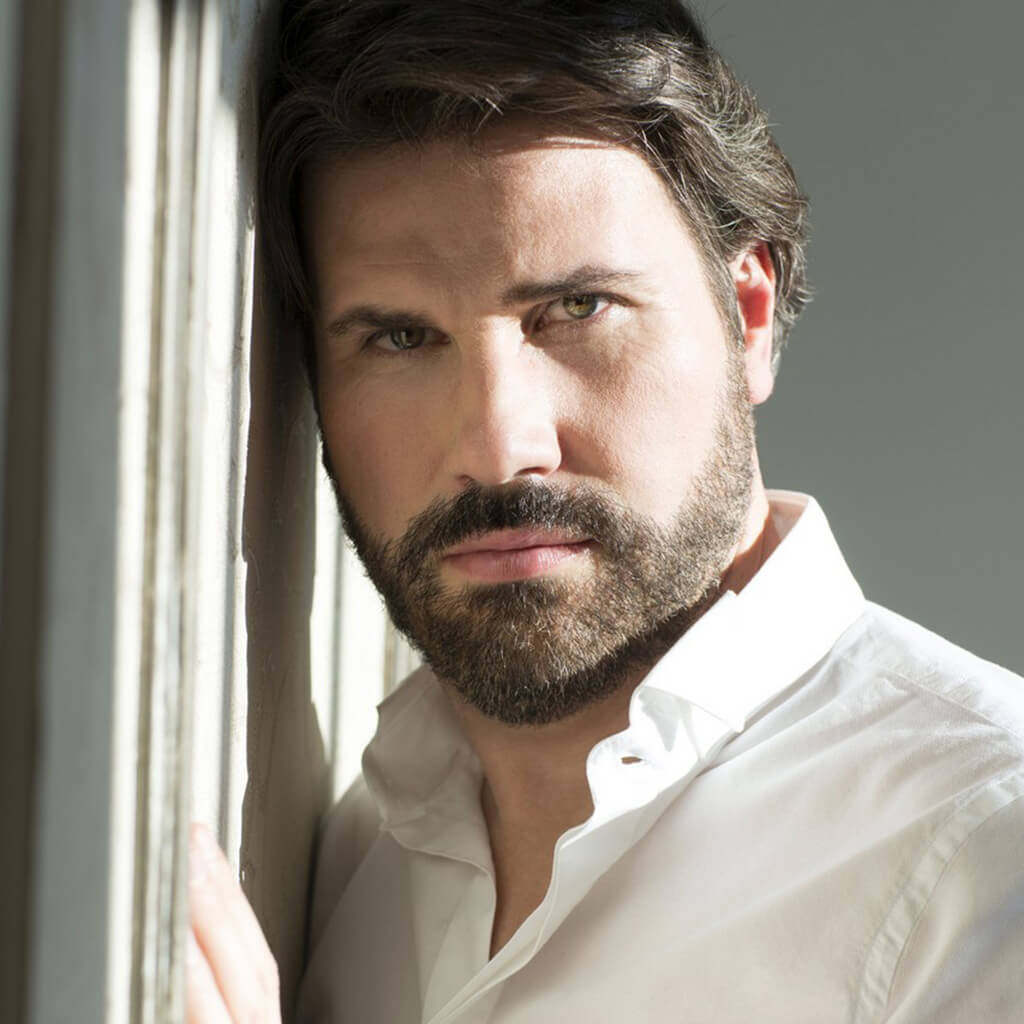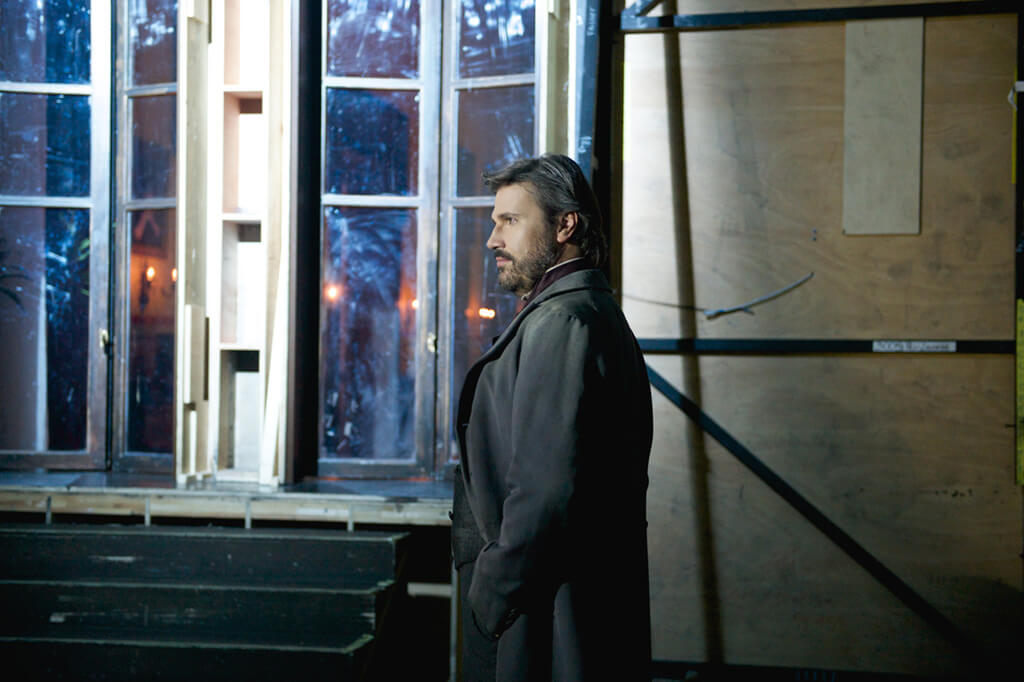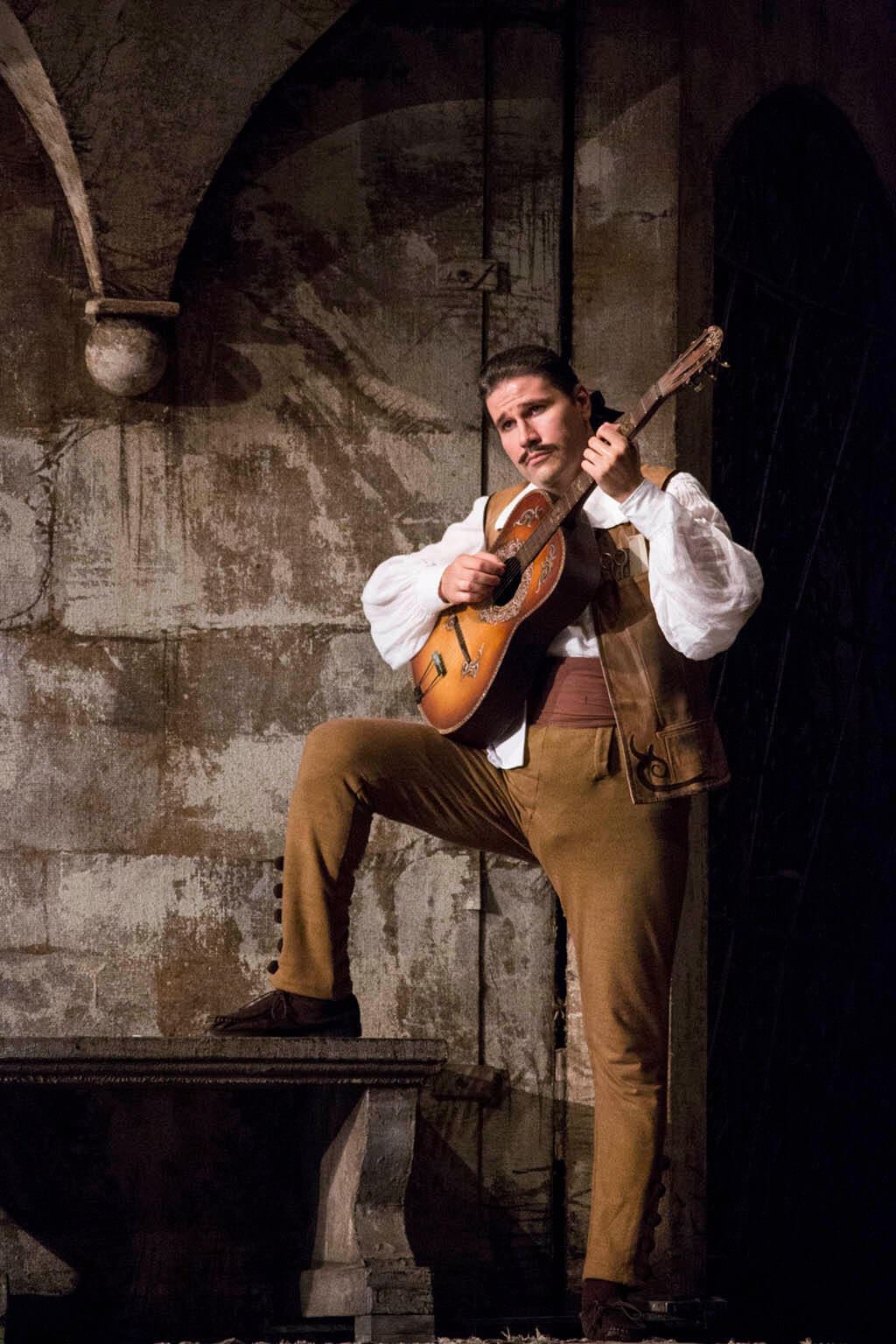The personable Italian baritone makes his belated Canadian debut.

Now in its tenth season, the annual New Year’s Eve Extravaganza, Bravissimo! Opera’s Greatest Hits is a must-see event for Toronto area opera lovers. What’s more fitting than a gala concert to bid farewell to the year that has just passed? It gives fans a chance to hear well known Canadian opera singers joined by international stars, some singing in Canada for the first time.
A headliner at this year’s concert is Italian baritone Massimo Cavalletti, who is making his belated Canadian debut. A native of Lucca, Italy, the lyric baritone is in demand in all the major opera houses from La Scala to Covent Garden to Paris to the Met, in such roles as Figaro, Rodrigo, Ford, Escamillo, Marcello, and Enrico, to name a few. It’s fair to say Cavalletti is the archetypal 21st–century opera singer, combining a terrific voice, photogenic looks, and abundant stage charisma.
Before his arrival in Toronto on Boxing Day for rehearsals, I reached him by phone to Lucca, in Tuscany, where he was spending Christmas with his parents. In our forty-minute conversation, the personable Mr. Cavalletti fielded my many questions with charm and disarming candor. His English, while not quite idiomatic, is good. I only did minor editing in the Q&A below, to maintain the flavour of our chat:
Let me start by saying that we in Toronto are looking forward to your Canadian debut. Is this going to be your first time in Canada?
Yes, it’ll be my first time in Canada. I’ve been to New York many times to sing at the Met, but never to Canada. I am just a little bit afraid of Toronto because it will be very cold! I’ll see if I am able to walk around.
[Laughs] it’s not that bad! You’ll just have to wear a scarf, and bring lots of warm clothes! Tell us a little about the Bravissimo concert. What will you be singing?
I’ll sing the Toreador Song from Carmen; “Largo al factotum” from Il barbiere di Siviglia; and the big aria from Un ballo in maschera – “Eri tu.”
Any duets?
No, no duets, just arias. We’ll also sing with the chorus. They sent me the music to something by Robert Burns. Everybody sings it with the audience joining in.
Ah, Auld Lang Syne! We always sing this at New Year’s Eve. You’ll probably also sing “Libiamo” from La traviata, right?
Yes, but there’s nothing for me in “Libiamo” [laughs], only tenor and soprano and maybe mezzo.

Have you worked with Maestro Marco Guidarini before?
No, I’ve never sung with him, but I know he’s a very good conductor, especially good in this repertoire. I am looking forward to it. I fly to Toronto on Dec. 26, and start rehearsal the day after.
Have you sung with the other Italians, sopranos Barbara Bargnesi and Francesca Sassu?
I just did La bohème in Teatro Regio Torino. There were two casts, and Francesca Sassu was singing Musetta in the other cast. One night the baritone was sick, and I jumped in and sang with Francesca. She’s a very good friend now. Francesca is a very good singer – the Canadian audience will enjoy her.
Tell us a bit about your upbringing. Do you come from a musical family? Are there other musicians in your family?
No, no musician in my family, not at all. I never expected when I was young to be an opera singer; I wanted to be an electronic engineer. I studied it until 21 or 22. Then I found my voice. I was singing in the church choir since I was 6, but I never thought about opera.
What was the first opera you saw, do you remember?
It was at the Teatro del Giglio in Lucca – Barber of Seville. Since 1998, I started to sing in the chorus in Lucca, Pisa, Livorno, Torre del Lago. I started with all the operas – Tosca, Turandot, Bohème, Les contes d’Hoffmann, Die Zauberflöte, Don Carlo. I did a few small roles while in the chorus, until 2001-2. Then I started concerts in Italy, not big, important concerts. In 2004, I had the opportunity to study in the Accademia Teatro Alla Scala in Milano. From that moment my real opera life started. I debuted in 2004 in Bergamo north of Italy in an unknown Donizetti opera, Parisina.
Since you were born in Lucca, the birthplace of Puccini, have you always been exposed to his music?
Puccini’s music is very important for me because it reminds me of the sound of my hometown, Lucca, and of the Tuscan countryside. The language Puccini uses in the opera is very comfortable for me. I speak Italian with a Tuscan accent, and I’ve just debuted as Gianni Schicchi [story set in Florence]. I’ve been singing Marcello and Schaunard in La bohème since the beginning of my career. I debuted as Schaunard in La Scala in 2005 and repeated it many times, including the Met. I sang my first Marcello in 2007 in Zurich. In the future, I hope I’ll have the opportunity to sing the more important, more difficult Puccini baritone roles.

Like Scarpia maybe? Any plans to sing Scarpia?
Hmmmm… no. Maybe after I am 50!
Ah okay, maybe you are too young for Scarpia! If you don’t mind my asking – how old are you?
I’m 39. Scarpia is like Jack Rance, in La fanciulla del West. This role is amazing, but for me, it’s difficult to believe me in this role. I have in my mind such great baritones as Giangiacomo Guelfi and Sherrill Milnes, with that dark, big, strong sound. I am a lyric baritone. I think for me, I need many years before I should try this repertoire. I sang Lescaut in Berlin and the Met, and I’m going to sing it again in the future. Roles like Enrico and Rodrigo – if an artist sings it in a good way, they have a success. For the Lescaut and Marcello kind of roles, it’s difficult to get noticed, even if you are a big star. Even Escamillo. Even the biggest stars don’t have success as Escamillo. But it has a great aria for concerts which I am singing in Bravissimo.
I noticed you sing a lot of bel canto. It tells me you have the agility, the coloratura for this repertoire.
Yes, it’s perfect for my voice, but it’s the agility for the more lyric-coloratura Rossini, like the Barber, and not the typical Rossini baritone roles like Dandini and others. Barber is very important to lyric baritones – Nucci, Protti, Gobbi, Bastianini, even the biggest operatic baritones have sung Barber, but they never sing any other Rossini role.
Do you have any idols – from the past and the present?
From the past, it’s Ettore Bastianini. For the present, it’s Leo Nucci. He is my idea of a complete artist – an actor, a great singer, and a great teacher.
You also studied with him at one point?
I studied with him at the Accademia Alla Scala, and then sang with him many times, in Simon Boccanegra. We did around 40 performances, with me singing Paolo and him Simon. During the rehearsals, we had lots of time to speak to each other and we talked about opera interpretation and technique. When you spend so much time with an artist, you can learn a lot.
You also studied with Luigi Alva?
Yes, I spent two years in La Scala Academy. I studied with Maestro Alva, especially in recitativi of Rossini and Mozart repertoires. His voice was still there; he could sing with us. He told us how to change the voice to give different colours in recitativo.
You have sung in many famous opera houses, do you have a favourite?
Teatro La Scala is my favourite. I’ve sung 600 performances in my life, 520 operas and 80 concerts. 100 opera performances were in La Scala, in 19 different productions and many roles. Every night in La Scala is a great night, an emotional night. The workers there for me are family. I know them by name. Every time I step onto La Scala, I feel at home. They recognize me because I am there so often. It’s very friendly.
But I’ve heard that a lot of singers are afraid of the La Scala loggionisti.
Yes, they are afraid because [the loggionisti] are not just about the voice, but also the competence of the opera singers, and their choices [of roles]. Some artists believe they can sing anything, that every role is the same. They have no respect to the character. When you go to La Scala to sing, especially Verdi operas, you have to respect a lot, to know exactly how to sing every single note. In Italian repertoire, the meaning of every word is so important.
Did you see the La Scala opening night that was live streamed? They just opened with Andrea Chenier, with Anna Netrebko.
Yes, I have to tell you I don’t like to see opera on tv because the sound isn’t so real on tv. I hope to, when I go back to Italy from Toronto, to go see it in person. If I can’t go in person, I don’t want to see it on tv. For example, when we sing at the Met, the sound is very real. At the Met they use microphones not on the body of the singer but on the stage floor. The sound is real, the same as what the audience would hear; the difference is minimal. But in Italy they don’t like the “atmosphere microphones” and prefer individual microphones. The quality for me is not good enough. It’s fake.
With body mikes, you can’t really tell the size of the voice.
Exactly! Every voice is equalized. I know very well the voices of all my colleagues – not just strong or not strong, but also the colours. You have to go to see it live to enjoy it.
Do you sing in languages other than Italian? You sing Escamillo, so you also sing in French. Do you sing things like Lescaut in Manon or Valentin in Faust?
I sing in Italian and French. In French, I sing Escamillo yes, also Le Cid, La Juive (Ruggiero). In the Zurich production of La Juive, Ruggiero is a bigger role.
What are your dream roles, roles for the future?
Well, one of my dream roles will be very soon, di Luna in Il trovatore, in Florence, Sept. 2018. [Teatro del Maggio Musicale Fiorentino, conducted by Fabio Luisi]
But di Luna is more of a dramatic baritone, not lyric?
I will try to sing it in a lyric way, as I sing in Lucia and Puritani, lyric and Romantic. For the future, I hope to sing [the title role of] Rigoletto, and maybe one day, [Carlo di Vargas] in La forza del destino. Carlo is lyric and dramatic at the same time. Needs lots of experience. I don’t like to sing it as everybody sings it now. Today singers sing everything. I would like to discover the roles, to look into the roles, not just the notes but go deeper. We have to more than just sing the notes; you have to respect the composer.
Since you are only 39, do you see maybe 10 years from now, you’ll try Iago?
I think for Iago, it will be 50 or 55. It will be one of the last operas – Iago, Macbeth for my voice. It’s far into the future. One role that can be earlier is Simon Boccanegra. I sang so many times with Leo Nucci and also with Placido [Domingo], I know the role very well. I feel very clear the meaning, the words. Leo explained everything to me about Simon Boccanegra. I hope between 2020 and 2022 to debut. I think my voice is dark enough and I have the high notes for the role. I recently sang Schicchi and had a success as a father and an actor on stage. Verdi wrote to Boito and Ricordi, saying that for Simone Boccanegra we need an actor-baritone, not just a singer. Simon you have to be also an actor, a person with the stage in his blood. In 2020-22, it will be almost 20 years on stage for me. I think it will be time for me to sing this.
Do you still live in Lucca?
No, my parents live in Lucca, and I’m here for Christmas. I lived in Zurich from 2008 to 2015. I was Fest [artist] at the Zurich Opera from 2008 to 2013. Then I moved to Lugano, the south part of Switzerland.
When you’re in Toronto, you must come to look at our beautiful opera house! It has excellent acoustics, and only 5 minutes away from Roy Thomson Hall where you will be singing. I hope you will come to sing opera in the future. You know Maestro Guidarini has conducted at the COC twice? He was just here two years ago for La Traviata, and Bravissimo last year.
I know the Toronto opera house is a good house to sing; the audience is very passionate. I hope this will be the first step for many other engagements in Canada in the future.
Thank you, Massimo, and toi toi toi for Bravissimo!
+++
Readers can catch Massimo Cavalletti’s Toronto detut at Bravissimo! Opera’s Greatest Hits on December 31, 2017, at Roy Thomson Hall. For details see here.
#LUDWIGVAN
Want more updates on Toronto-centric classical music news and reviews before anyone else finds out? Follow us on Facebook or Twitter for all the latest.
![]()



